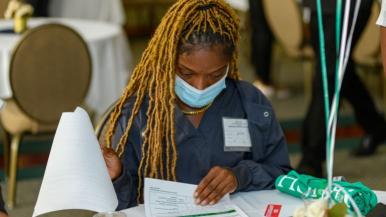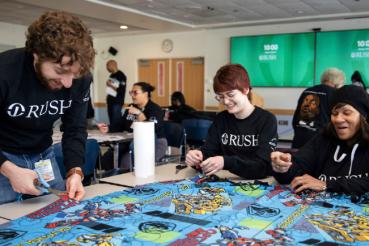Rush and Harper College have begun a novel apprenticeship for aspiring medical assistants, the first of its kind in Illinois.
While common in other industries, the apprenticeship model — in which trainees are employed while receiving hands-on training — is rare in health care. This pilot program is an innovative approach that could be an overlooked strategy in connecting workplaces with workforces.
Despite the high demand for medical assistants throughout health care, colleges and universities offering medical assistant degree programs aren’t attracting as many students as they could. But ads announcing this paid apprenticeship program created so much interest that the Harper website nearly crashed. Amaree Delton, a member of the apprenticeship’s first cohort, said she believes she knows why.
“At first, I thought ‘this can’t be true,’” Delton said. “Being a health care provider, especially being able to care for people in my community, has always been a dream. But I’m a single mom and couldn’t quit my job and go to school.”
”In just over four weeks, there were more than 4,000 interest forms completed,” said Molly Moran, director of Ambulatory Clinical Practice at Rush University Medical Center. “The interest is definitely out there.” The first cohort 22 of started in August
A perfect storm
Of all the clinical positions within a medical center, medical assistants are ones that patients most often come into contact with, without even realizing it.
“They can do anything from assisting at the front desk all the way up through assisting in procedures, and seeing patients in collaboration with the nurse for specific visits,” Moran said. “They can really helping expedite patients who need prescription refills, or need referrals elsewhere. So really they are really serving as a key member of the care coordination team.”
Medical assistants are a crucial part of keeping a medical institution running — and many institutions, including Rush, are facing a shortage. The COVID pandemic accelerated years of staffing challenges into a crisis. A tight job market, burnout from the pandemic and newly available remote work options have created what Moran calls “a perfect storm” in health care staffing challenges. And medical assisting is no exception.
“The average inpatient length of stay was just over seven days in the hospital,” Moran said. “Now the average length of stay sits over five days, and that follow-up care is shifting to ambulatory, which means there’s an increased need in medical assistants. The pandemic most certainly exacerbated that need. But it really made the landscape ripe for doing something new.”
Being an MA can also be the first step in a long health care career. Candalaria De La Rosa graduated this year with a degree in microbiology but wasn’t sure what path to take.
“But when my mother was very sick, I saw first-hand the difference medical assistants make,” De La Rosa said. “The doctors provided treatment, but I remember thinking it was the MAs who really provided the care.”
Breaking barriers
To develop a bigger medical assistant workforce, Moran said they needed to address the biggest barrier to becoming certified as an MA: finances.
All medical assistant students must complete clinical hours that usually demand they reduce or stop their working hours, putting pressure on themselves and the families they may be supporting.
“What we found, both from people who’ve gone through the program and chose to take a medical assistant position with us, as well as from our community partners, is that the largest barrier to a student completing an MA program is the inability to work and go to school,” Moran said. “They have to stop working to complete those clinical hours and that was really a financial burden for them that preventing them from finishing.”
To break this barrier, Rush worked with the well-established medical assistant training program at Harper College to develop a paid apprenticeship. Apprenticeships are a rarity in within health care, but have been used within other industries to build and maintain workforces for years, including manufacturing, airlines and, most recently, information technology.
“The expertise of Harper having already set up so many apprenticeship programs has made this a relatively smooth process,” Moran said. “I am so grateful for their partnership and their leadership because I do think we’re well-positioned to launch this first cohort in August.”
Moran says the outpouring of interest when the program was announced shows how the shortage is caused not by a lack of enthusiasm for the role, but the need for employers and educators to work to eliminate roadblocks that keep people from these career opportunities.
“If you provide an education, for individuals to make a living wage and have access to health care, you’re not only setting them up not only for day one, but you’re setting them up for the future, and I think that’s what I find most exciting about this program,” she said.
Finding a new way of speaking
The apprenticeship for the first cohort will run 16 months total through three tiers, increasing in responsibilities for the apprentices. As the group gets underway, Moran said she knows there will be bumps in the road, but it’s also an opportunity for growth.
“I think the biggest challenge is going to be in the clinic, helping the team adapt to this new way of speaking around education and training,” she said. “In conversation I would say everyone has been completely on board, from our care coordinator staff and our current medical assistants, all the way up to the chief medical officers. Everyone is genuinely excited to try this.”
And as the new members of the Rush University Medical Center team begin to find their footing as colleagues and students, Moran said she is confident that they will be assets to the Rush's health equity mission.
Delton said she’s proud that she can immediately begin making a difference. “Maybe someday I’ll be an RN,” she said. “But today I know that as medical assistant I’ll be helping patients right away. And to be honest, as a Black woman I might be able to connect with many patients in a different way that might help them feel better and get better. I’m proud to be able to do that and show that this program works.”




